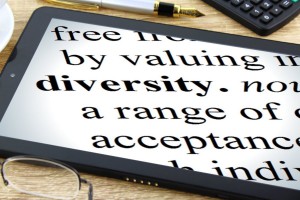Recognize Diversity Through #HumansofPRSSA

Growing up, I remember one of my family’s favorite games to play at the dinner table was “the person game,” commonly known as Guess Who. The game starts with a single player thinking of a person while other players ask yes or no questions to try and discover the identity of the person the player has in mind.
As a family with five children, we soon covered a long list of people ranging from pop culture icons, religious leaders, politicians and athletes to family members, teachers or even a person in the room. Each detail gave more insights about the person and allowed us to ask increasingly specific questions.
In addition to helping us think creatively, the game also made certain names infamous in the Cook family household. U.S. Olympic Gold Medalist Michelle Kwan gained a permanent reputation after my mother once chose her as her “person” and the guessing lasted nearly a week before we gave up.
But more memorable than the names, the game taught me how we, as humans, naturally categorize each other. These divisions occur through various distinguishers, whether they be definition, reputation or familiarity.
In life, many people find themselves trying to figure out the descriptors that would make them a guessable human in the person game. What will be my career? What will my major be? Where will I live? How much money will I make? Will I have a family?
While it can be a natural tendency to categorize people based on a few general pieces of information, this can become a dangerous habit if we assume too much based on too little information.
Just think for a moment how you would react if you were playing the person game and someone guessed Josef Stalin when you were thinking of George Washington. While you may answer yes to some of the same questions, classifying these men as successful, male, military commanders, you would never describe Stalin as an American hero.
Recognizing that limited questions provide limited knowledge, we must also realize that focusing on listening will help us understand others much more quickly and accurately than a barrage of standardized questions and confident assumptions. Encouraging others to share from their own perspective about why they are unique helps us to better recognize what we have in common and what makes us diverse.
This month, PRSSA will launch its #HumansofPRSSA social media campaign designed to help students develop a better understanding of diversity. As you see members of PRSSA in the spotlight and notice the general, obvious characteristics in regard to identity, age, ethnicity or school, be sure to read between the lines of their stories and words to understand what makes each individual unique and diverse.
As you follow, like, comment, share or retweet posts from the campaign via PRSSA social media accounts to help create a stronger and more inclusive PRSSA. Together we will build a Society that recognizes, appreciates and celebrates diversity, as well as prepares students to successfully build relationships throughout their careers.
—
Andrew Cook is the PRSSA 2016–2017 vice president of advocacy and a senior studying public relations at Brigham Young University. Follow him on Twitter @adcook22.
